The mental health crisis among first responders, a group that encompasses firefighters, police officers, emergency medical technicians (EMTs), and paramedics, represents a silent epidemic that has profound implications for society. Despite their critical role in ensuring public safety and responding to emergencies, these individuals face significant mental health challenges, often with insufficient resources or support to address them effectively.
The Burden of the Badge and the Hose
First responders are regularly exposed to life-threatening situations, traumatic events, and high-stress environments. This constant exposure to trauma puts them at a heightened risk for conditions such as Post-Traumatic Stress Disorder (PTSD), depression, and anxiety, significantly higher than the general population. The nature of their work involves witnessing human suffering and making life-and-death decisions, which imposes a significant emotional burden.
Statistics Highlighting the Crisis
- It is estimated that 30% of first responders develop behavioural health conditions, including depression and PTSD, compared with 20% in the general population.
- Studies have shown that firefighters have higher rates of suicide attempts and ideation compared to the general populace. For law enforcement officers, estimates suggest that between 125 and 300 officers commit suicide every year.
Barriers to Seeking Help
Despite the evident need for mental health support, there are intrinsic barriers that prevent first responders from seeking the help they need. These barriers include stigma, fear of diminished capacity on the job, informal codes of silence, and the high cost of treatment. Such challenges are compounded by a culture within these professions that valorizes toughness, further discouraging individuals from acknowledging their mental health struggles.
The Path Forward: Supporting Our First Responders
Addressing the mental health crisis among first responders requires a multifaceted approach:
- Raising Awareness: Increasing awareness about the mental health challenges faced by first responders is crucial. This involves advocating for their well-being and ensuring that mental health issues are recognized and addressed promptly.
- Improving Access to Resources: Departments and agencies should integrate mental health resources, such as counselling services, peer support programs, and stress management training, into their standard protocols.
- Cultural Change: Creating a supportive community culture where mental health issues can be discussed openly without fear of judgment or repercussions is essential. This involves dismantling the stigma associated with mental health in these professions.
- Community Support: The community can play a role by advocating for better mental health resources for first responders and acknowledging the sacrifices they make.
Conclusion
The mental health crisis among first responders is a pressing issue that demands immediate attention. By understanding the challenges these individuals face, supporting them through comprehensive resources, and fostering a culture of openness and support, we can begin to address this silent epidemic. Let’s commit to supporting the mental health of our first responders, acknowledging their service, and ensuring they have the resources they need to thrive.

